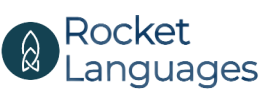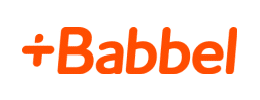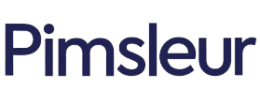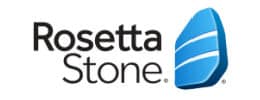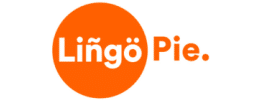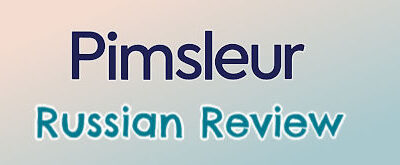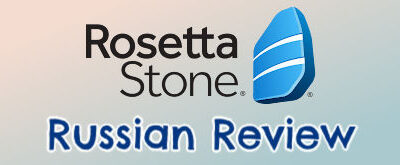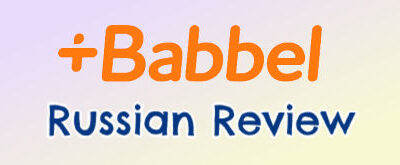We extensively tested a number of French language learning apps over the course of a year, and we discovered more or less what one would expect. Some French language programs are definitely worth the money, while others are shockingly bad. In this post, we focus on the former, and highlight the five standout apps that impressed us the most with their effectiveness and quality.
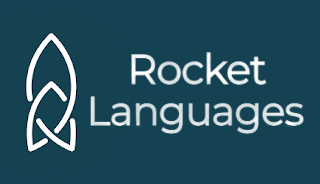
Sale: 60% OFF
Use Code: INSIGHT60
|
$180 lifetime |
Our absolute favorite French program. With audio lessons, detailed grammar instruction, and diverse exercises, Rocket French is the best overall app we used. |
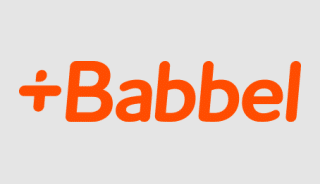
Sale: 55% OFF
Applied in Cart
|
$8-$15/mo |
Our top pick for French beginners and those on a budget. The perfect introduction app with quick lessons and essential content. |
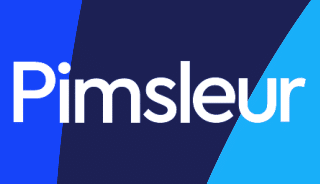
Free 7-Day Trial
Sign Up Today
|
$20/mo |
Like Rocket French, but with its own highlights. Pimsleur offers in-depth audio lessons, a modern interface, smart drills, and solid content. |
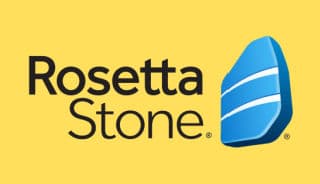
Discount: 60% OFF
Applied In Cart
|
$10-$15/mo |
The classic language learning company still has it. With learning based on immersion and imagery, this is the perfect app for visual learners. |
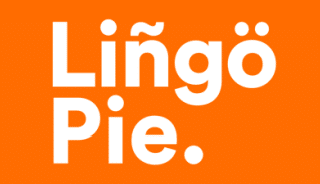
Sale: 70% OFF
Applied in Cart
|
$6-$12/mo |
This is the perfect supplement to any language program once you reach a certain level of fluency. Combine watching French shows and movies with learning. |
Editor’s Choice
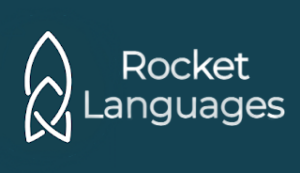
Rocket Languages
- Free Trial
- 14-Day Money Back Guarantee
Pros
- Interactive audio lessons are great at developing your conversational skills
- Uses Google’s speech software to grade pronunciation
- Dedicated grammar lessons are insightful and useful
- Very deep learning curriculum
- Reinforcement drills post-audio lesson really help to drive material home
Cons
- Lessons are lengthy (typically one hour each)
- Not many pictures or visuals in this program
Rocket French: A Surprising Gem
At first glance, Rocket French might not catch your eye, but don’t let that fool you. I had low expectations as well, but this app blew me away.
Rocket offers a genuinely comprehensive approach to learning French that sets it apart from others in the language learning world. It strikes a really nice balance between academic rigor and engaging content, making it a top contender for serious learners.
Engaging Audio Lessons
The heart of Rocket French lies in its audio lessons, which are crafted to be both engaging and instructive. These 30-minute sessions are a far cry from the monotonous repetition of traditional language learning methods (see Duolingo).
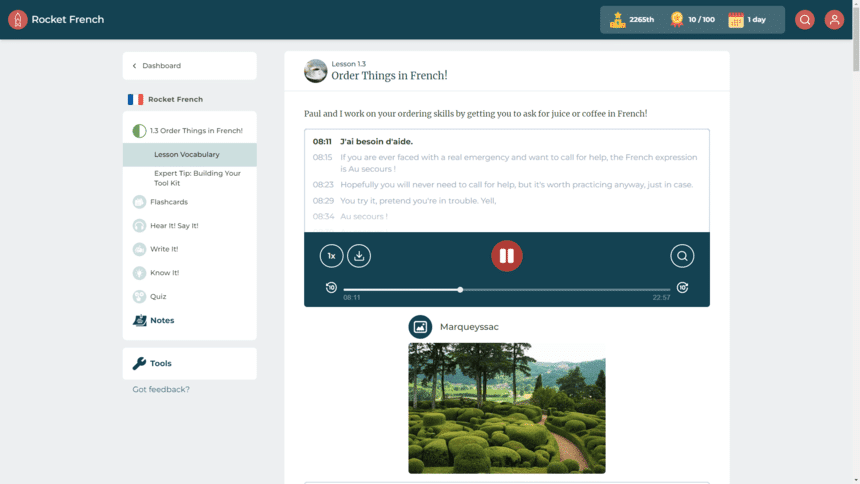
These sessions feature an English-speaking guide who leads you through the material, explains concepts in a clear and relatable manner, introduces new vocabulary in context, and encourages active participation. In short, I found these lessons to be highly effective.
Comprehensive Approach
What truly sets Rocket French apart from other apps is its comprehensive approach that extends beyond audio-only lessons. In addition to the audio component, the app also provides a range of supplementary tools, such as mock conversations, quizzes, flashcards, and detailed grammar instruction.
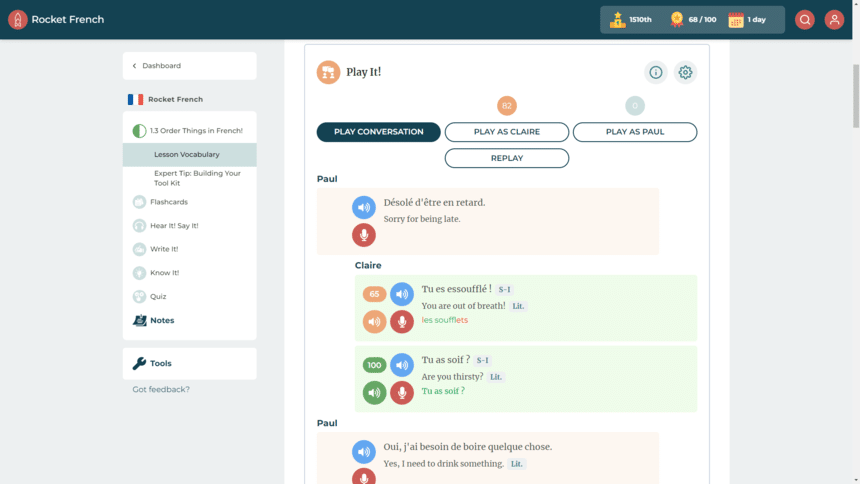
One thing that I particularly liked was the detailed grammar content. The grammar explanations are presented in a user-friendly manner and supported by numerous examples, which in my opinion greatly enhances the overall learning experience.
Quick Recap
With interactive audio lessons, reinforcement drills to make what you learn actually stick, and detailed grammar coverage, Rocket Languages is a must for serious French learners. It gets our highest overall grade.
👉 Read Full Rocket French Review
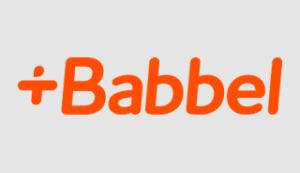
Babbel
- Several Plans To Choose From
- 20-Day Money Back Guarantee
Pros
- Engaging lessons that move fast and are effective
- Daily review sessions take just 2-3 minutes
- Tons of cool extras, like podcasts, games and live classes
- Grammar instruction is easy to digest
- Affordable price tag (under $10/mo)
Cons
- Left us wanting more verbal/speaking practice
- Speech recognition software is just alright
Babbel: Ideal for Beginners and Budget-Conscious Learners
Babbel is a great choice for beginners who are looking for an affordable way to start learning French. It won’t get you to fluency overnight, but it provides a solid foundation for those aiming to reach an intermediate level.
Structured Learning Path
One of the key strengths of Babbel is its structured approach to learning. The app guides you through a carefully designed curriculum that starts with basic vocabulary and gradually progresses to more complex grammar and conversational skills.
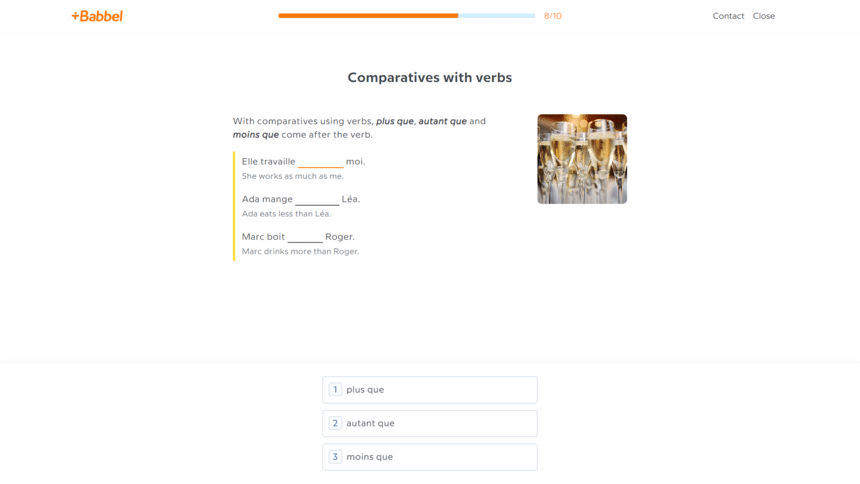
This structured path helps you stay focused and motivated as you see your progress over time. Other apps have jumbled curriculums and unorganized lessons, which we didn’t care for, but not Babbel.
Practical Vocabulary
One nice aspect of Babbel’s approach is how they focus on teaching practical vocabulary that you can immediately use in real-life situations. Instead of overwhelming you with unnecessary words and phrases, it prioritizes the essentials that will enable you to start using French in everyday conversations from the get-go.
Interactive Lessons
The last noteworthy item here is lesson design. The Babbel lessons are interactive and engaging, incorporating a variety of exercises to reinforce your learning.
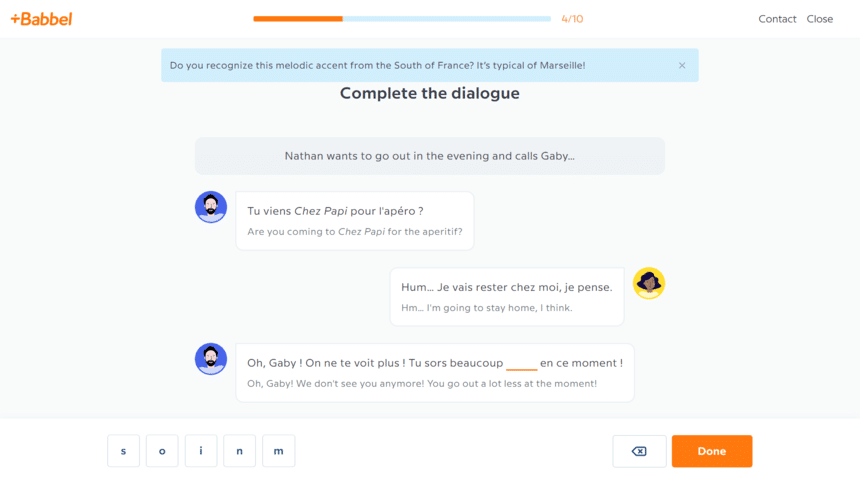
From listening and speaking exercises to writing and grammar drills, the app offers a well-rounded learning experience that caters to different learning styles. Plus, with lessons that are just 10 minutes long, they are very manageable.
Quick Recap
Babbel is the perfect app for beginners and/or budget shoppers. With 10-minute, easily digestible lessons, it will take you from knowing nothing to conversational French.
👉 Read Full Babbel French Review
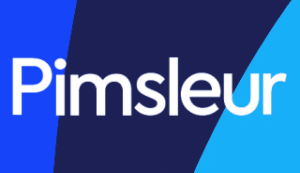
Pimsleur
- Monthly Subscription Plans
- Learn Online or Offline
Pros
- Very effective learning framework based on in-depth audio lessons
- Useful driving mode feature (like podcasts)
- Very cool platform with modern interface (sleek and responsive)
- Fun and fast-moving reinforcement drills backstop audio lessons
Cons
- Audio lessons can feel kind of academic
- No images, video or other visuals
Pimsleur: A Comparable Alternative To Rocket French
If you’re looking for something like Rocket French, but slightly differentiated, Pimsleur offers an audio-based learning experience that is similar, but at a more affordable price point.
While its lessons may be more formal in tone, they provide comprehensive and accurate instruction that worked well for us.
Audio-Centric Approach
Pimsleur’s lessons are primarily audio-based, focusing on improving your listening and speaking skills. Each lesson is structured to build upon the previous one, gradually increasing in complexity as you progress through the course.
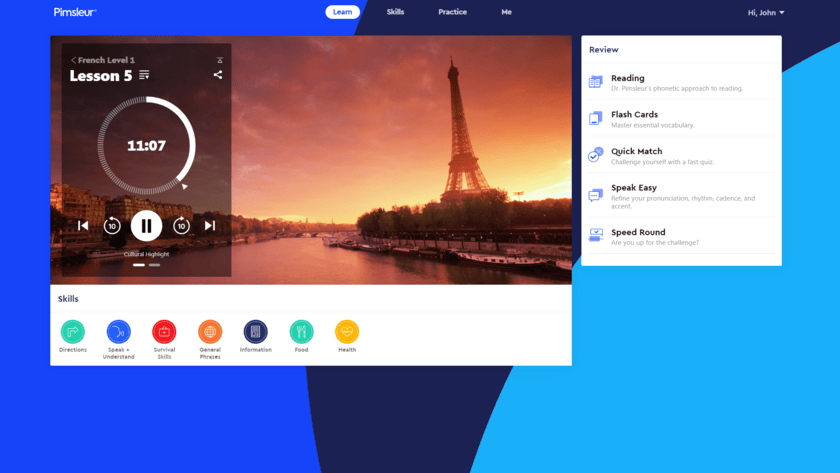
However, while Rocket strikes a more conversational tone, Pimsleur’s lessons may have a more formal and academic approach. This might not sound like fun, but this can be beneficial for learners who prefer a structured and disciplined approach to language learning. In other words, it’s dry, but it works.
Special Features
One standout feature of Pimsleur is its dedicated driving mode, which makes it convenient for learners to study while on the go. This feature is especially useful for commuters or anyone with a busy schedule. It’s like listening to a podcast in the car.
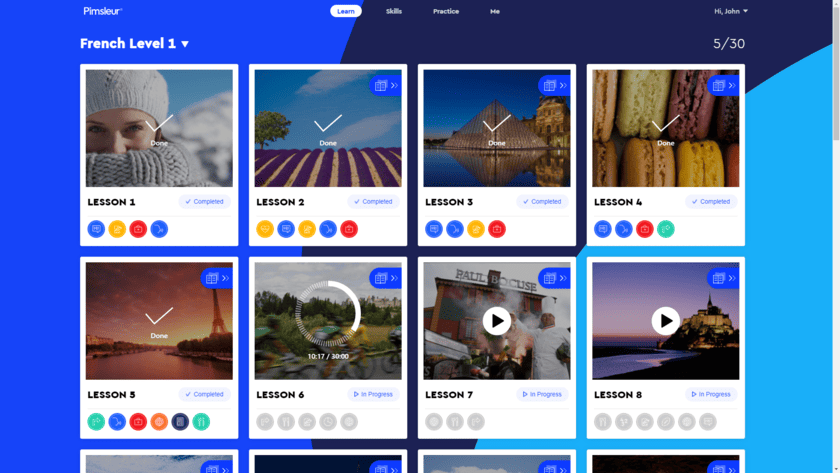
Quick Recap
Pimsleur is like Rocket French’s cousin. Both are based on similar teaching methodologies, but differ in certain areas. Pimsleur’s strengths over its counterpart lie in its monthly subscription plans, dedicated driving mode (think podcasts) and superior interface.
👉 Read Full Pimsleur French Review
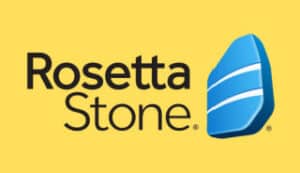
Rosetta Stone
- Multiple Subscription Options
- Money Back Guarantee
Pros
- Perfect course for visual learners (entire program is built on images)
- Learning framework is based on immersion
- Affordable subscription options (as low as $10/mo)
- Tons of useful bonus resources (e.g., on-demand videos)
- Modern and easy-to-use interface (great mobile app)
Cons
- Lessons can become somewhat boring at times
- Wish lessons used more in-depth verbal practice
Rosetta Stone: Immersive and Effective
Rosetta Stone takes a rather different and bold approach to language learning by immersing you in the French language from the start. While this can be intimidating initially, it’s a highly effective method for developing fluency.
Immersive Learning Experience
The core philosophy of Rosetta Stone is immersion. The app presents you with images and scenarios, asking you to associate them directly with the corresponding French words and phrases.
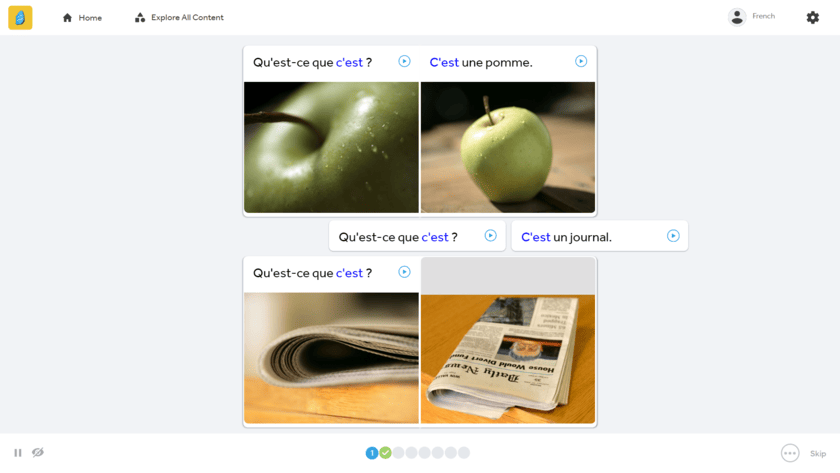
By bypassing translations and explanations in English, Rosetta Stone encourages you to think in French from the outset, which is crucial for fluency.
Visual Learning Focus
Rosetta Stone heavily emphasizes visual learning—more so than any other app we’ve used. They use images to reinforce vocabulary and concepts in every exercise.
In my opinion, this approach is particularly beneficial for visual learners who find it easier to remember words and phrases when associated with visual cues.
Natural Language Progression
One of the strengths of Rosetta Stone is its natural language progression. The app starts with basic vocabulary and gradually introduces more complex grammar and conversational skills.
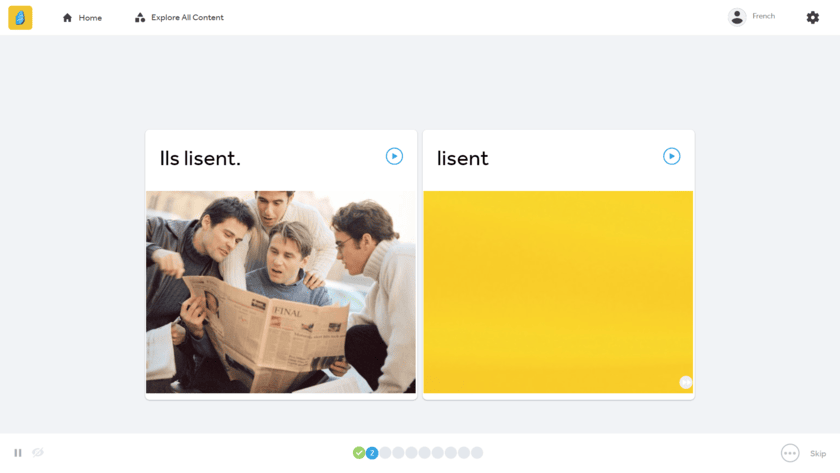
This gradual buildup helps learners develop a strong foundation in the language. Unlike other apps, such as Mondly, this natural progression increases vocabulary development.
Quick Recap
Rosetta Stone is the perfect choice for visual learners and those looking for a more immersive approach to learning French. Cutting out English can make the process difficult, but it is effective.
👉 Read Full Rosetta Stone French Review
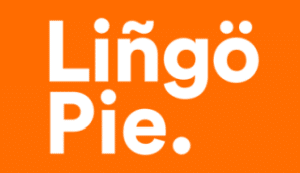
Lingopie
- Multiple Subscription Options
- Cancel Whenever
Pros
- Very unique language learning method based on watching TV and movies
- Tons of assistive features layered in to improve learning process
- We used the playback speed feature and grammar tool a bunch
- Only $6 per month
Cons
- No set lesson plan or clear learning path
- Best suited for learners with some basic knowledge of French
Lingopie: A Different Approach to Immersion
Lingopie takes a unique approach to immersion by incorporating TV shows and movies into its language learning method. In fact, they don’t just incorporate TV shows and movies, the program is shows and movies.
While it may lack a structured learning path, it offers a cost-effective way to supplement your language learning with authentic and engaging content.
Premium Video Content
Lingopie’s approach is centered around using authentic French-language TV shows and movies as learning material. This not only provides exposure to real-life language use (which is great for speeding up fluency), but also makes the learning process more enjoyable and engaging.
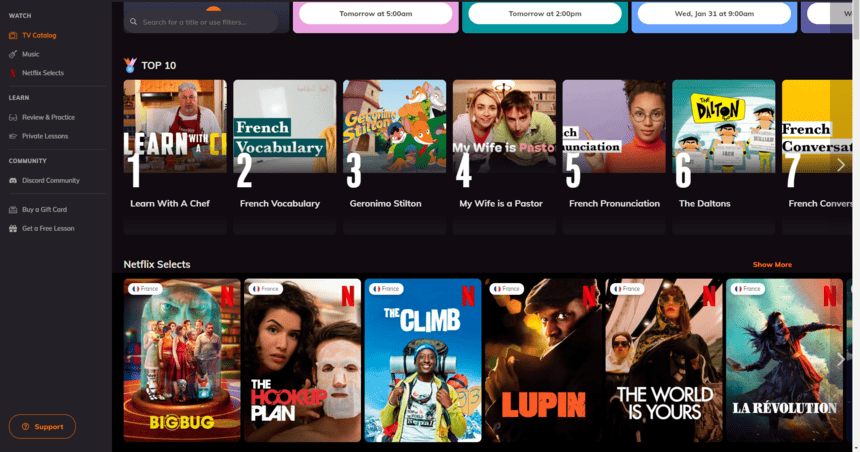
Plus, their library is deep. With a Netflix integration, as well as in-house licensed material, there is thousands of hours of material to watch.
Learning Tools Integration
Lingopie is much more than subtitles on foreign language films. The app offers various learning tools which complement its video content, such as flashcards, grammar points, and slow-motion playback.
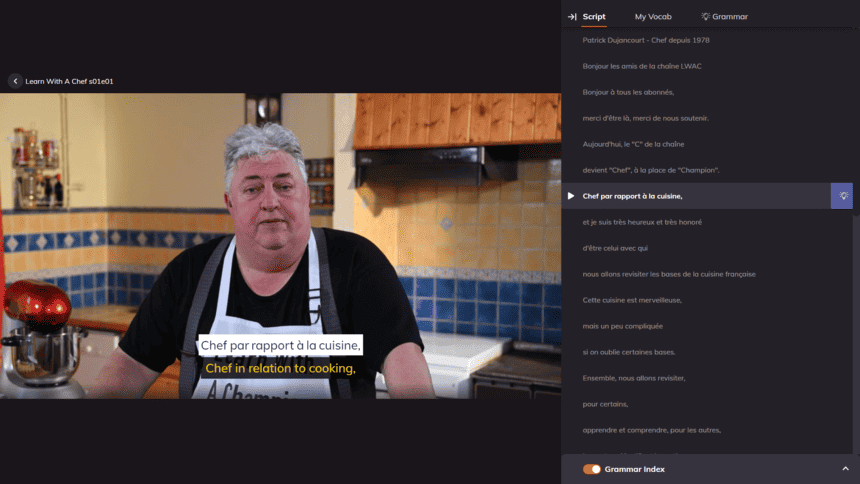
These tools enhance the learning experience by allowing you to interact with the material in different ways. For reference, my favorite part was slowing down playback speed to .75x and auto-generating flashcards.
Value for Money
One of Lingopie’s main strengths is its affordability. With a low monthly subscription fee (under $6 per month for some plans), it offers excellent value for learners who want to supplement their studies with authentic French media.
Quick Recap
Lingopie is the ideal program for those looking to supplement another program like Babbel or Pimsleur, or juice up your vocabulary if you already have a decent French foundation.
After testing more than 20 French language apps, there were a few that rose above the others. Our overall favorite and highest-scoring app was Rocket French, followed closely by Babbel, Rosetta Stone, and Pimsleur.
Your typical French language app costs around $10 to $15 per month. Some apps (like Pimsleur and Rocket Languages) do cost more, but generally speaking, expect to pay around $10 to $15 per month.
Personally, I think nothing beats direct immersion for French, but short of that, language learning apps are effective—assuming you find the right one for your goals and learning style. Do your research and test them out to see which one resonates with you.
If you go to live in Lyon for a couple months, I have no doubt you will become fluent in less time than that. However, if you want to do so from the comfort of your own home, it can take anywhere from three months to a year or more, depending on your time commitment and learning tools.

